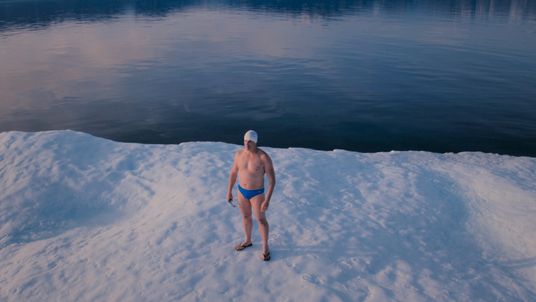There is now runaway climate change in the Arctic.
That's the conclusion of Lewis Pugh, cold water swimmer and the United Nations' Patron of the Oceans.
Lewis visited the edge of the Arctic ice pack, where he did a perilous one kilometre swim to raise awareness of the catastrophic impact of climate change.
He came close to dying.
His message to world leaders is simple. Act now or the entire ecosystem is in peril.
The Arctic is warming twice as fast as the rest of the planet.
According to the US National Oceanic and Atmospheric Administration, the average air temperature of the region was 1.6 degrees above normal in 2017. Parts of the ocean were 4 degrees above normal.
As a result, sea ice is melting from above and below.
Over the last 30 years the area of ocean covered by ice at the end of the summer - the so-called sea ice minimum - has halved. The ice that remains is also thinner.
The problem is this: the white surface of ice reflects 80% of sunlight.
But as it melts it exposes the dark ocean, which absorbs 90% of the sunlight. The ocean heats up, accelerating the ice melt.
Based on current data, the ocean will be ice-free in summer, some time in the 2030s.
Saving the ice will need rapid action by world leaders: big cuts in carbon dioxide emissions will have to be made - and soon - to slow the warming trend.
:: Disappearing sea ice could lead to collapse of vital polar food chain
Lewis' Arctic journey started in the far north of Canada, where he met Inuit elders living in the coastal settlement of Pond Inlet.
Lifelong resident 85-year-old Gamali said the ice that used to cover the sea at the same time each year is becoming thinner and more unpredictable.
Three of his friends have died recently after falling through the ice.
The changing ice conditions are also exposing marine mammals in the area to new threats.
So many whales spend the summer feeding in the nutrient-rich waters that Lancaster Sound is often referred to as the 'Serengeti of the Arctic'.
It is estimated there are 100,000 narwhals, 30,000 belugas, 6,500 bowhead whales in the area.
But with Lancaster Sound ice-free for longer period each year, more ships pass through the area - some using the North West Passage as a shortcut between Europe and Asia, and others to take iron ore from a nearby mine.
The industrial noise drowns out the sounds whales make to navigate, hunt and communicate. It can have catastrophic consequences.
In 2008, more than 1,000 narwhal were so frightened by the loud seismic 'booms' used to find oil and gas reserves that they retreated to an area of sea that freezes over each autumn.
There was only one small hole in the ice for the mammals to breathe. Almost all drowned.
The Canadian government has announced that Lancaster Sound will be designated a Marine Protected Area, preventing further exploration for fossil fuels and other commercial exploitation.
But vast swathes of the Arctic remain unprotected.
Lewis's second stop around the Arctic was the Norwegian islands of Svalbard.
The landscape has changed dramatically since he last swam here 12 years ago. Glaciers that flowed into the fjords have retreated several kilometres towards the land. The fjords used to freeze over each winter.
All but one are now ice-free year round.
Scientists at the international research base of Ny-Alesund are monitoring the impact on Kongsfjorden.
The only remaining cold water in the fjord is found immediately in front of the glaciers.
The water harbours specialised polar species, including plankton, that contain high levels of omega-3 fats. These are passed up the food chain to fish, birds and ultimately larger predators such as polar bears.
All the animals rely on the fatty diet for the energy they need to keep warm in the harsh conditions.
But if the glaciers retreat up on to land the cold water will disappear and with it the fatty polar creatures.
Scientists just don't know what the impact will be on the food chain.
To highlight these threats, Lewis Pugh undertook a dramatic swim along the ice edge at 82 degrees north.
The temperature of the water was minus 0.7 degrees - and he only wore swimming trunks.
He almost quit after 650m, but after a pause he carried on, completing the kilometre in 22 minutes.
Some 90 minutes later, despite a hot shower and being swaddled in several layers of duvets, his body temperature was still only 35 degrees - two degrees lower than normal and clinically hypothermic.
:: Arctic swimmer: 'I've never come so close to the end'
He braves the risks because of the world attention that the swims bring.
Media coverage of his swim in the Ross Sea, Antarctica, encouraged Russian officials to sign up to a deal to create a massive marine reserve .
He hopes his Arctic swim will also shake world leaders into action.
But time is running out to save the ice and the animals that depend on it for their survival.
:: Arctic Peril will be broadcast on Sky Atlantic tonight at 8pm (GMT) and Sky News on Wednesday 20 December at 9pm.







